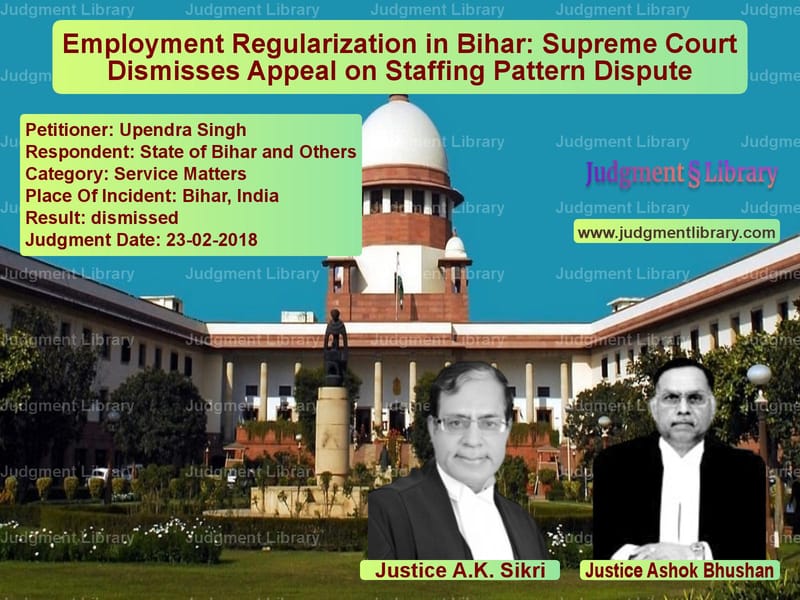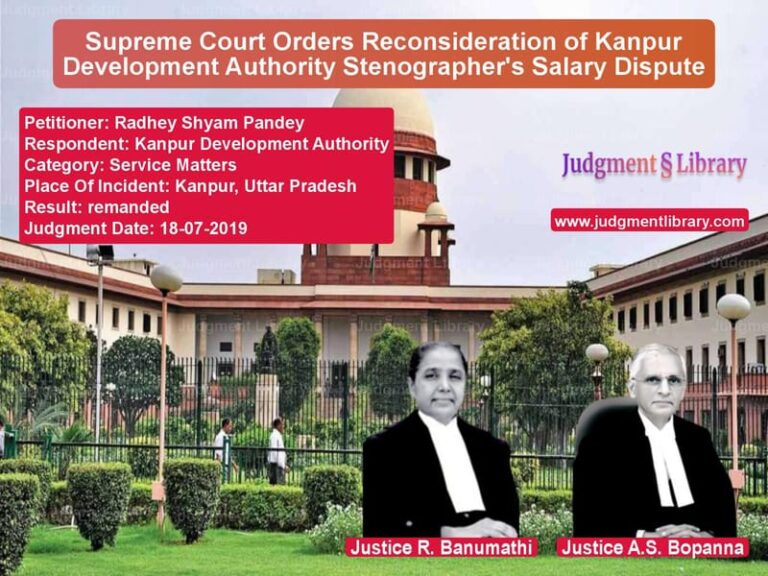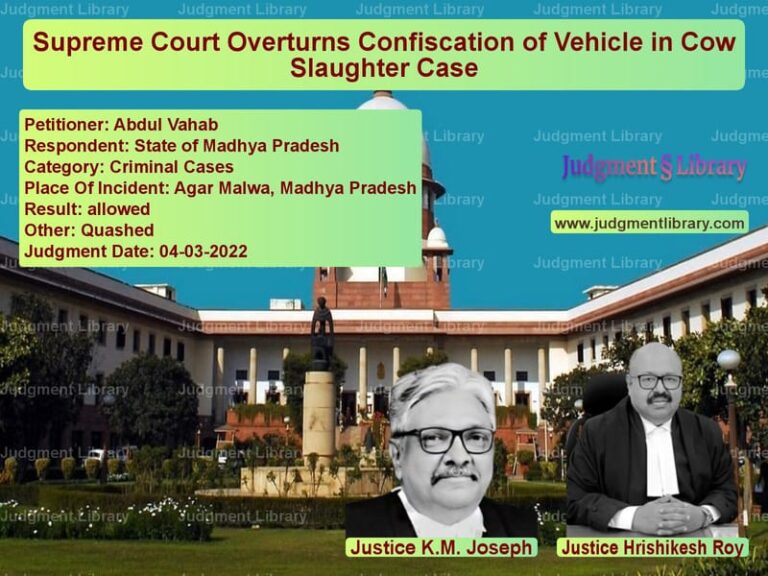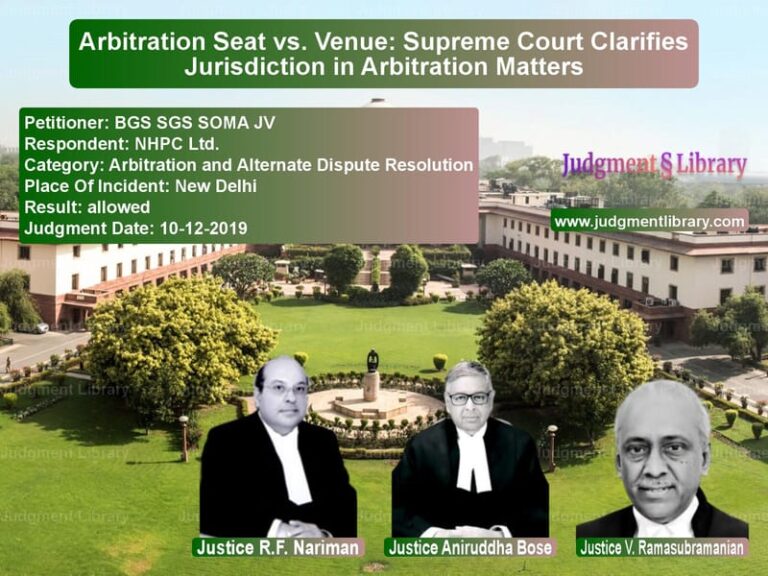Employment Regularization in Bihar: Supreme Court Dismisses Appeal on Staffing Pattern Dispute
The Supreme Court of India has pronounced a significant judgment in the case of Upendra Singh vs. State of Bihar & Others, ruling against the appellant’s plea for employment regularization. The case centered around the claim of a non-teaching staff member in a government-aided college in Bihar who sought regularization of his employment and salary benefits after the institution was taken over by the state government. The ruling reinforces the principle that government employment must follow due process, sanctioned staffing patterns, and constitutional principles of fair selection.
Background of the Case
The dispute arose when Upendra Singh and ten other employees of K.D.S. College, Bihar, approached the Patna High Court, seeking absorption into regular service. They argued that since the college had transitioned from a private institution to a government constituent college, their employment should have been automatically regularized. The High Court dismissed their petition, and Singh, feeling aggrieved, took his appeal to the Supreme Court.
Chronology of Events
- Singh was appointed as a non-teaching staff member in K.D.S. College on January 24, 1978, following an internal selection process.
- In 1980, the Bihar government decided to integrate affiliated colleges into its university system, and K.D.S. College became a constituent college on June 16, 1981.
- After the college transitioned, Singh continued to work, but he and other employees faced salary payment issues.
- The Bihar government and the university authorities had agreed in 1989 to absorb existing employees based on a staffing pattern.
- Singh’s case was considered multiple times, but his regularization was repeatedly denied due to the lack of sanctioned posts.
- In 2010, Singh and others filed a writ petition, which was dismissed in 2013. The subsequent intra-court appeal also failed in 2013.
- Singh alone appealed to the Supreme Court, arguing that his employment should have been regularized based on long service and past agreements.
Arguments by the Petitioner (Upendra Singh)
Singh’s counsel made the following key arguments:
- His appointment was made through a valid selection process, and he had been working in the college for over two decades.
- The government’s decision to convert K.D.S. College into a constituent college implied that existing employees should be absorbed.
- Since a staffing pattern had been approved, Singh should have been included among the regularized employees.
- He was denied salary payments for over a decade despite performing his duties.
- The university authorities had in principle agreed to regularize employees in similar circumstances.
Arguments by the Respondents (State of Bihar & Others)
The state and university authorities presented the following counterarguments:
- Singh was never appointed against a sanctioned post.
- His appointment did not follow the due process of recruitment mandated under Article 14 of the Constitution, which requires equal opportunity.
- The university had reviewed his case in 2003 and found his appointment irregular.
- There were no vacant posts under the staffing pattern that could accommodate him.
- Singh’s appointment had been made by the private management of K.D.S. College before it became a government constituent college, and the state was not obligated to regularize such appointments.
Supreme Court’s Judgment
The Supreme Court upheld the High Court’s ruling and dismissed the appeal. The Court cited the Constitution Bench ruling in Secretary, State of Karnataka & Ors. v. Umadevi & Ors. (2006), which emphasized that government employment must be based on sanctioned posts and transparent recruitment processes.
The Court observed:
“The appointment of the appellant and others was not in accordance with law. It was made without advertisement and there was no recommendation of a panel by the Selection Committee. The appointments were not made by the competent authority.”
It further stated:
“Regularization of employment is permissible only when an appointment follows proper recruitment procedures and is made against a sanctioned post. The absence of sanctioned posts prevents the courts from granting regularization benefits.”
Analysis of the Judgment
Applicability of the Umadevi Judgment
The Court applied the principles set forth in Umadevi, which restricted the regularization of employees who were not appointed through a fair and transparent recruitment process. It clarified that while long service alone does not create a right to regularization, employees appointed against sanctioned posts through proper selection procedures could seek such benefits.
Impact on Contract and Daily Wage Employees
The ruling clarifies that individuals working for long periods without due appointment cannot demand regularization. This has a significant impact on thousands of contract workers in government institutions, ensuring that employment practices adhere to constitutional principles.
Constitutional Principles of Equal Opportunity
The Court’s emphasis on Article 14 ensures that no individual is granted a backdoor entry into government service. It reaffirms that employment opportunities must be available to all eligible candidates through fair competition.
Key Takeaways from the Judgment
- Strict Adherence to Recruitment Rules: The judgment reiterates that government job appointments must comply with established rules and procedures.
- No Regularization Without Sanctioned Posts: Employees cannot be absorbed into regular service unless there are sanctioned vacancies.
- Past Agreements Do Not Create Legal Rights: Even if authorities previously agreed to consider regularization, it does not override legal principles.
- Precedent for Other Government Employees: This ruling will likely influence similar cases involving contractual and ad hoc government employees.
Impact of the Judgment
The Supreme Court’s ruling has far-reaching implications for employment disputes in the public sector:
For Employees
- The judgment establishes that merely working in a government institution for a long time does not grant an automatic right to regularization.
- It highlights the importance of securing appointments through proper recruitment channels.
For Employers (Government and Universities)
- It affirms that the government and universities must strictly follow recruitment norms.
- The ruling prevents pressure from employees seeking regularization without proper procedures.
Conclusion
The Supreme Court’s decision in Upendra Singh vs. State of Bihar serves as a landmark ruling on employment regularization in government-aided institutions. The verdict reaffirms the necessity of following constitutional and statutory recruitment procedures. By dismissing the appeal, the Court has upheld the integrity of public employment systems, ensuring that government jobs are awarded through transparent and competitive means.
As public sector employment remains a highly contested issue in India, this ruling will set a strong precedent for future cases involving employment disputes in government-aided institutions.
Petitioner Name: Upendra SinghRespondent Name: State of Bihar and OthersJudgment By: Justice A.K. Sikri, Justice Ashok BhushanJudgment Date: 23-02-2018
Don’t miss out on the full details! Download the complete judgment in PDF format below and gain valuable insights instantly!
Download Judgment: Upendra Singh vs State of Bihar and O Supreme Court of India Judgment Dated 23-02-2018.pdf
Direct Downlaod Judgment: Direct downlaod this Judgment
See all petitions in Employment Disputes
See all petitions in Public Sector Employees
See all petitions in Recruitment Policies
See all petitions in Judgment by A.K. Sikri
See all petitions in Judgment by Ashok Bhushan
See all petitions in dismissed
See all petitions in supreme court of India judgments February 2018
See all petitions in 2018 judgments
See all posts in Service Matters Category
See all allowed petitions in Service Matters Category
See all Dismissed petitions in Service Matters Category
See all partially allowed petitions in Service Matters Category







